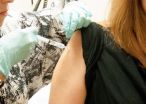Stroke damage mechanism identified
2014-11-27
(Press-News.org) Researchers have discovered a mechanism linked to the brain damage often suffered by stroke victims--and are now searching for drugs to block it.
Strokes happen when the blood supply to part of the brain is cut off but much of the harm to survivors' memory and other cognitive function is often actually caused by "oxidative stress" in the hours and days after the blood supply resumes.
A team from the University of Leeds and Zhejiang University in China studied this second phase of damage in laboratory mice and found a mechanism in neurons that, if removed, reduced the damage to brain function.
Co-author Dr Lin-Hua Jiang, of the University of Leeds' School of Biomedical Sciences, said: "Until now, much of the drug research has been focussing on the direct damage caused by the loss of blood flow, but this phase can be hard to target. The patient may not even be in the ambulance when it is happening. We have found a mechanism that is linked to the next phase of damage that will often be underway after patients have been admitted to hospital."
The study, published in the journal Cell Death and Disease and supported by a strategic partnership between the University of Leeds and Zhejiang University, looked at the damage caused by the excessive production of chemicals called "reactive oxygen species" in brain tissues immediately after blood supply is re-established. In a healthy brain, there are very low levels of reactive oxygen species, but the quantity dramatically increases after a stroke to levels that are harmful to neurons.
Dr Jiang said: "We identified an 'ion channel' in the membranes of neurons, called TRPM2, which is switched on in the presence of the reactive oxygen species. Basically, an ion channel is a door in the membrane of a cell that allows it to communicate with the outside world-- TRPM2 opens when the harmful levels of reactive oxygen species are present and we found that removing it significantly reduced neuronal cell damage."
The researchers compared the effects of strokes on mice with TRPM2 with a transgenic strain without it.
"In the mice in which the TRPM2 channel does not function, the reactive oxygen species are still produced but the neurons are very much protected. The neuronal death is significantly reduced. More importantly, we observed a significant difference in brain function, with the protected mice demonstrating significantly superior memory in lab tests," Dr Jiang said.
"This study has pinpointed a very promising drug target. We are now screening a large chemical library to find ways of effectively inhibiting this channel. Our ongoing research using animal models is testing whether blockage of this channel can offer protection again brain damage and cognitive dysfunction in stroke patients," Dr Jiang said.
INFORMATION:
The research was funded by the Royal Society, Alzheimer's Research UK, the Natural Science Foundation of China and the National Basic Research Program of China.
Further information:
Contact: Chris Bunting, Senior Press Officer, University of Leeds; phone: +44 113 343 2049 or email c.j.bunting@leeds.ac.uk.
The full paper: M. Ye et al,'TRPM2 channel deficiency prevents delayed cytosolic Zn2+ accumulation and CA1 pyramidal neuronal death after transient glo Q1 bal ischemia' will be published in Cell Death and Disease on 27 November 2014 [DOI:10.1038/CDDIS.2014.494; URL: http://dx.doi.org/10.1038/CDDIS.2014.494]. Copies of the paper are available on request from the University of Leeds press office.
Notes for Editors
The University of Leeds is one of the largest higher education institutions in the UK and a leading research powerhouse. It is a member of the Russell Group of research-intensive universities. The University was ranked in the top 100 of the world's best universities in the QS World University Rankings 2014. http://www.leeds.ac.uk
Alzheimer's Research UK is the UK's leading charity specialising in finding preventions, treatments and a cure for dementia. To help defeat dementia, donate today by visiting http://www.alzheimersresearchuk.org or calling 0300 111 5555. Alzheimer's Research UK is currently supporting dementia research projects worth over £22 million in leading Universities across the UK. The Defeat Dementia campaign, a pledge to raise £100 million in five years to grow the research field and accelerate progress towards new treatments and preventions, was announced by the Prime Minister at the G8 legacy event on 19 June 2014. For more information visit http://www.dementiablog.org/defeat-dementia
ELSE PRESS RELEASES FROM THIS DATE:
2014-11-27
A large-scale study led by the University of Exeter has found that boys are more likely to be stillborn than girls. Published in the journal BMC Medicine, the study reviewed more than 30 million births globally, and found that the risk of stillbirth is about ten percent higher in boys. This equates to a loss of around 100 000 additional male babies per year.
The results could help to explain why some pregnancies go wrong. Around a quarter of stillbirths have no known cause. Of the remainder, many are linked to placental abnormalities but it is often unclear why the abnormalities ...
2014-11-27
Drinking 3-5 cups of coffee per day may help to protect against Alzheimer's Disease, according to research highlighted in an Alzheimer Europe session report published by the Institute for Scientific Information on Coffee (ISIC), a not-for-profit organisation devoted to the study and disclosure of science related to coffee and health.
The number of people in Europe aged over 65 is predicted to rise from 15.4% of the population to 22.4% by 20251 and, with an aging population, neurodegenerative diseases such as Alzheimer's Disease are of increasing concern. Alzheimer's Disease ...
2014-11-27
Using world-leading research methods, the team of Dr David Wright and Prof Paul Holmes, working with Dr Jacqueline Williams from the Victoria University in Melbourne, studied activity in an area of the brain responsible for controlling movements when healthy participants observed a video showing simple hand movements and simultaneously imagined that they were performing the observed movement.
Using transcranial magnetic stimulation - a technique where a coil placed over the scalp delivers a stimulation to the brain, activates neurons in the underlying area, and causes ...
2014-11-27
TORONTO, Nov. 26, 2014 - Ontario students between Grades 9 and 12 who said they had a traumatic brain injury in their lifetime, also reported drug use rates two to four times higher than peers with no history of TBI, according to research published today in The Journal of Head Trauma Rehabilitation.
"Overall, a teen with a history of TBI is at least twice as likely as a classmate who hasn't suffered a brain injury to drink alcohol, use cannabis or abuse other drugs," said Dr. Michael Cusimano, co-principal investigator of the study and a neurosurgeon at St. Michael's ...
2014-11-27
This news release is available in French.
The world's first clinical trial comparing three alternative treatments for type 1 diabetes was conducted in Montréal by researchers at the IRCM and the University of Montreal, led by endocrinologist Dr. Rémi Rabasa-Lhoret. The study confirms that the external artificial pancreas improves glucose control and reduces the risk of hypoglycemia compared to conventional diabetes treatment. The results, published today in the scientific journal The Lancet Diabetes & Endocrinology, could have a significant impact on the ...
2014-11-27
Leading medical experts today [Thursday 27 November] warn that rising numbers of deaths from liver disease - already the UK's third commonest cause of premature death - will be unavoidable without radical improvements in treatment and detection services, and tougher government policies to control the excessive alcohol use and obesity responsible for much of the national burden of liver disease.
In a major new Lancet Commission, led by Professor Roger Williams, Director of the Institute of Hepatology, London, UK, doctors and medical scientists from across the UK call ...
2014-11-27
Boston, MA. Wednesday, November 26, 2014 -- Researchers from the Broad Institute of MIT and Harvard, Harvard Medical School, and Harvard-affiliated hospitals have uncovered an easily detectable, "pre-malignant" state in the blood that significantly increases the likelihood that an individual will go on to develop blood cancers such as leukemia, lymphoma, or myelodysplastic syndrome. The discovery, which was made independently by two research teams affiliated with the Broad and partner institutions, opens new avenues for research aimed at early detection and prevention of ...
2014-11-27
TORONTO, Nov. 26, 2014--The nervous system may play a bigger role in infections and autoimmune diseases than previously known. If researchers can learn more about that role, it could provide insight into diagnosing and treating everything from the stomach flu to rheumatoid arthritis.
Researchers at St. Michael's Hospital in Toronto, in conjunction with the Feinstein Institute for Medical Research in Manhasset, N.Y., reviewed the latest, most vigorous pre-clinical trials on this topic in a commentary published Wednesday (Nov. 26) in the New England Journal of Medicine. ...
2014-11-27
An experimental vaccine to prevent Ebola virus disease was well-tolerated and produced immune system responses in all 20 healthy adults who received it in a Phase 1 clinical trial conducted by researchers from the National Institutes of Health. The candidate vaccine, which was co-developed by the NIH's National Institute of Allergy and Infectious Diseases (NIAID) and GlaxoSmithKline (GSK), was tested at the NIH Clinical Center in Bethesda, Maryland. The interim results are reported online in advance of print in the New England Journal of Medicine.
"The unprecedented scale ...
2014-11-26
ANN ARBOR--The spaghetti-like internal structure of most plastics makes it hard for them to cast away heat, but a University of Michigan research team has made a plastic blend that does so 10 times better than its conventional counterparts.
Plastics are inexpensive, lightweight and flexible, but because they restrict the flow of heat, their use is limited in technologies like computers, smartphones, cars or airplanes--places that could benefit from their properties but where heat dissipation is important. The new U-M work could lead to light, versatile, metal-replacement ...
LAST 30 PRESS RELEASES:
[Press-News.org] Stroke damage mechanism identified


